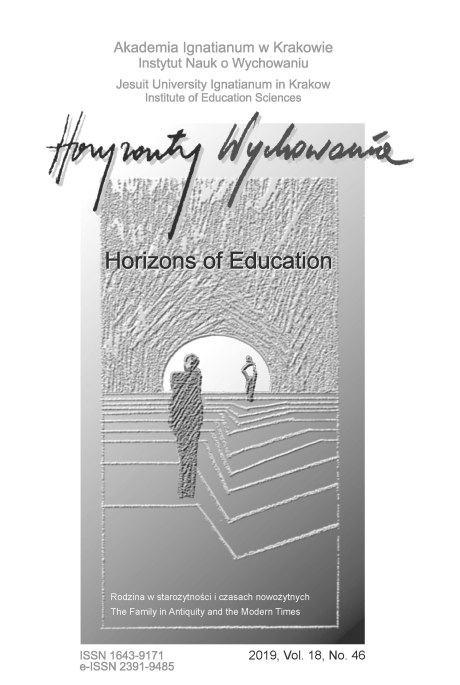Rodzinne tradycje pisania instrukcji wychowawczych w epoce nowożytnej
Family Traditions of Writing Educational Instructions in the Modern Age
Author(s): Dorota Żołądź‑StrzelczykSubject(s): Education, Modern Age, History of Education, Family and social welfare
Published by: Uniwersytet Ignatianum w Krakowie
Keywords: family; educational journeys; educational instructions; modern age; the Republic of Poland;
Summary/Abstract: RESEARCH OBJECTIVE: The objective of the article is presenting family traditions of writing instructions for children sent to boarding schools or on educational journeys. THE RESEARCH PROBLEM AND METHODS: The research was to find the answer to the question what kind of instructions were given in educational institutions, what their objective was and who created them. The analysis referred to the instructions applied in families such as the Radziwiłł, Sobieski, Lubomirski, Jabłonowski or Rzewuski family. THE PROCESS OF ARGUMENTATION: Education in the modern age was usually related to the necessity of leaving the family house, which is why the parents gave their children instructions to guide and order their stay in a foreign place and environment. In most cases they were oral guide lines, advice, prohibitions and orders. Sometimes the instructions were included in the last wills, letters or separate papers addressed to the young people or their protectors. We may distinguish two types of such guidelines. The first kind includes educational instructions of moral and sometimes social-political nature. The second kind includes travel guidelines. RESEARCH RESULTS: The analysis of the instructions indicates that parents took responsibility for upbringing their children, being aware of both the importance of educational journeys in shaping the young person and the threats related to being far from the family and parental protection. The instructions were usually written by fathers. Mothers hardly ever wrote them. The family tradition of sending children, mainly sons, to Polish and foreign boarding schools, as well as sending them on educational journeys, played an important role in writing the educational guidelines. The tradition of writing such instructions did not occur only in Poland. Family traditions of preparing such guide lines may be noticed, inter alia, at our closest neighbours – in the Czech and Austrian territories. CONCLUSIONS, INNOVATIONS, AND RECOMMENDATIONS: The instruction, as a popular genre of pedagogical literature in the 17th and 18th century, which was of practical nature, constituted an important educational tool of parents from upper social classes.
Journal: Horyzonty Wychowania
- Issue Year: 18/2019
- Issue No: 46
- Page Range: 53-68
- Page Count: 16
- Language: Polish

